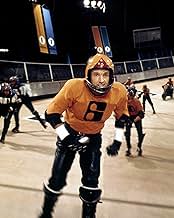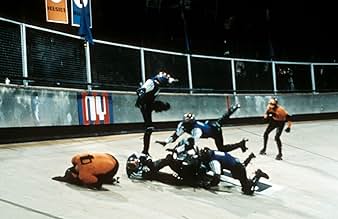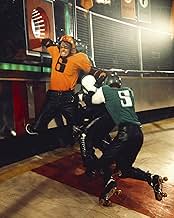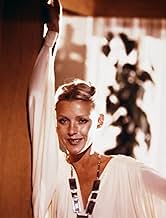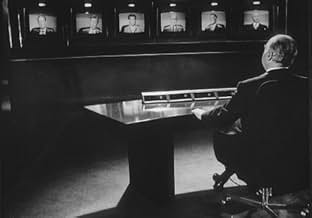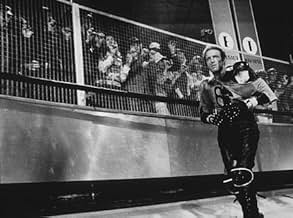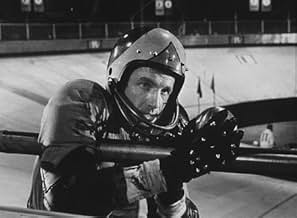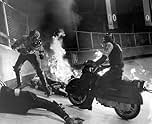Dans un avenir contrôlé par les entreprises, un sport ultraviolent qui représente le monde, et l'un de ses athlètes est là pour défier ceux qui le veulent hors du jeu.Dans un avenir contrôlé par les entreprises, un sport ultraviolent qui représente le monde, et l'un de ses athlètes est là pour défier ceux qui le veulent hors du jeu.Dans un avenir contrôlé par les entreprises, un sport ultraviolent qui représente le monde, et l'un de ses athlètes est là pour défier ceux qui le veulent hors du jeu.
- A remporté le prix 1 BAFTA Award
- 4 victoires et 5 nominations au total
- Bartholomew's Aide
- (as Rick Le Parmentier)
- Madrid Biker #1
- (uncredited)
- Houston Team Rookie
- (uncredited)
- Biker
- (uncredited)
Avis en vedette
My opinion of 'Rollerball' is that it is a flawed film but also a very impressive one. The momentum does sag, particularly in the middle, in some scenes not on the arena. Bogged down by a little too much extraneous talk, like the Ella story line, and a few ideas that could have gone into more depth. Of the characters, the only ones that are really developed like "real" characters are Jonathan E and Bartholomew (Ella particularly is a cipher), and parts while well intended are laid on too thick somewhat.
However, 'Rollerball' is well made visually. It's all very slick and stylish and the set for the rollerball arena still makes one go wow. Liked the look of the future dystopia, not extraordinary but it was atmospheric. Jewison directs with assurance, while the script has a lot of intelligent and thought-provoking lines and ideas that resonate a lot and still are very much relevant. The message is much appreciated and is very much pertinent.
Story is intriguing and has enough to compel, and Jonathan E and Bartholomew are very interesting characters. The supporting cast, particularly John Beck, are solid.
'Rollerball' excels particularly in four particularly strongly done areas. The tautly filmed and edited rollerball sequences are incredibly exciting and have a real sense of disturbing danger and nerve-shredding tension too. Andre Previn does well with the music score, but shining even more is to me some of the best use of classical music on film, including the most beautiful use of Albinoni's Adagio ('Manchester By the Sea' also used it beautifully but it's done more subtly here), Bach's Toccata used very creepily and the best use of Shostakovich on film. It's not just that the music itself is wonderful but also that they are so cleverly used, almost ironically and also unnervingly.
James Caan is a highly charismatic lead and gives the character nuances, while John Houseman's Bartholomew is chilling. One cannot review 'Rollerball' without mentioning the incredibly powerful ending either.
Overall, very impressive but flawed. 7/10 Bethany Cox
But in both films, we see the same powerful strategy: a complex, philosophical brain-twister beneath a deceptivly simple exterior. "Fiddler on the Roof" was seemingly a linear story about a struggling Jewish family's good & bad times. But the real meat of the story was about the conflict between old ways and new (tradition vs. progress). Here in "Rollerball" we have another seemingly linear story about an athlete in a violent, futuristic sport. But the real meat is the conflict of brutal human nature vs. suppression (again, a sort of "tradition vs. progress"). As with "Fiddler on the Roof", director Norm Jewison doesn't hit us over the head with any preachy sermon but instead leaves us to digest the situation.
"Rollerball" has the same powerful, brooding quality that we see in many of the 70s scifi masterpieces, like "THX 1138", "Soylent Green", "Planet of the Apes", "Blade Runner" (yeah I know that one was 1982), and the one that started them all, "2001: A Space Odyssey". Cold, sterile sets, disturbing situations and powerful use of silence characterize these films. By today's standards they might be considered slow, but depending on how you like your scifi, that might be right up your alley.
In a nutshell, the story is about a futuristic society that has largely done away with civilian violence. It has done this by "subsidizing" violence by way of a global pasttime: a hyper-violent sport called Rollerball. Note: as a parallel story, we learn that cut-throat corporate competition has been similarly squelched by the government creating monopolies. And thus society finds peace. Or does it? You can probably see the brilliant metaphors being woven here. This isn't an ordinary scifi romp, it's a powerful socio-political allegory. It cuts to the heart of human nature the way the great writers H.G. Welles, Mary Shelley and George Orwell did. No, you won't see a lot of laser battles, spaceships and aliens. But here you'll see an excellent example of what scifi was designed to do: comment on our current human condition by creating a fictional (extreme) scenario as a cautionary tale.
Excellent, and I mean EXCELLENT performances by James Caan (The Godfather, Misery), John Houseman (The Paper Chase, The Fog), Maud Adams (3 James Bond films), Moses Gunn (every 70s TV show from Hawaii 5-O to Shaft), and a particularly gripping performance by Pamela Hensley (Princess Ardala in "Buck Rogers" homina homina) make this an all-star powerhouse of 70s talent.
The music deserves a special mention of its own. From the opening notes of Bach's Toccata in Dm (the creepy "Dracula" theme) to Albinoni's haunting Adagio in Gm (check it out on YouTube... saddest song ever), "Rollerball" doesn't hold back.
They don't make 'em like this anymore. But there are a few modern scifi films that come close: "Moon", "District 9" and "Solaris" come to mind.
If you liked the films I mentioned in this review; if you liked the 70s classics "Catch-22" and "Coma" and "Stepford Wives"; if you like films that are both entertaining and works of art, do NOT miss Rollerball.
For laughs, after you watch Rollerball (1976), check out the remake done in 2002 ...and see how far we've come :/
Now, having just watched the movie twice in a night, the second time with the director's commentary, I have finally got to grips with the scenes between the action, and discovered that I like it more than ever. The view of the future is not highly original; tipping its hat to the stratified societies foreseen by Orwell and Huxley, amongst others; but nevertheless the portrayal is engaging. Jewison astutely realised that only by filling in the image of the future society, the characters, and the political background against which the tournament unfolds, would the game be seen as truly REAL for the characters. In the meanwhile, he also has the chance to build suspense, upping the stakes for both the heroic gladiator/combateur Jonathon, and his would-be puppet master Bartholemew. In this way, when we come to watch the actual contests, our enthusiasm is whetted, and by making the rules progressively more dangerous with each passing game, the stakes grow ever higher.
The central themes of the movie are (i) loss-of-soul/nihilism/sensual-vs-spiritual-happiness, and (ii) individuality vs state control. Perhaps the best scenes elucidating these themes are the famous `tree killing' scene, and the conversation between Jonathon and Ella in the forest. The use of imagery and metaphor is widespread; I will mention only the terrific concept of the roulette wheel as game arena, with the players INSIDE, instead of outside; and the Circus Maximus parallel. You may draw many interesting conclusions from this about the director's and writer's intent.
My final word is: watch it once, soak up the action, and be bored by the rest. Then view it again, feel yourself in Jonathon's dilemma, experience his wrenching disappointment with the people in his life who betray him, and try to tear yourself away if you can as he is pushed inexorably to his fate in the arena of ROLLERBALL.
The film "Rollerball"(United Artists,1975),was screenplay by William Harrison and directed by Norman Jewison,who was Oscar nominated for his brilliant direction in such films,"In The Heat Of The Night",and the musical "Fiddler On The Roof",is no stranger to science fiction material. The film is set in the year 2018 where there are no wars and no crime,but there is only....the Game. In a world where corporations rule and no one asks questions-the vicious and barbaric sport of Rollerball satisfies the violent impulses of the masses. Tuned to their televisions,the people watch the sport of the future which is a brutal mutation of football,the Romanesque gladiator fighting,motorcross and hockey. Jonathan E.(played brilliantly by James Caan) is the champion Rollerball player-a man too good for his own good. The corporation has taken away the woman he loves(Maud Adams),but they won't take away his soul even if the diabolical corporate head(John Houseman)tells him he'd better retire..or suffer the old-fashioned way.
With some surrealistic imagery,Orwellian theme,and tense action with some of the best action sequences ever filmed,this picture will grip you from the moment the ball rolling out and zooms into the stadium to its chilling cilmax,this movie has haunted audiences as it takes a look into the future and what the future would become,and has a stunning effect. James Caan's performance is something to marvel at and John Houseman's performance as the diabolical corporate executive is a chilling and stalking cold and with some of the strong support from its cast including John Beck,Moses Gunn,and Ralph Richardson.
The 1975 version is worth seeing..it is the original and still the best of its genre...Don't even bother with the 2002 version with was directed by John McTiernan.
I had some vague notion of the storyline, but I tried not to read the case or liner notes and take in the movie on a first impression. Released in the summer of 1975, there are definite and readily apparent influences of earlier films, not the least of which being Stanley Kubrick's "A Clockwork Orange." The colors, the film stock, the editing style are all reminiscent of that earlier, similarly-themed master work, yet I don't believe it detracted from this film at all.
Supposedly set in the year 2018 (though this is never established in the movie, that I could tell), corporations have replaced governments and managed to eliminate war, poverty, disease and bad hair days. People don't have too much of a say in what goes on around them, but they're all very physically comfortable. Of course, the violent nature of the human beast must be satisfied, and it is -- in the gladitorial ring of the world's most popular sport, Rollerball. The game consists of two teams (from cities all over the world) skating and motorbiking around a 1/8-mile track, trying to get a steel ball into a goal. As the course of the season progresses, more and more limitations as to what constitutes fair play are removed, and by the final, the melee is total.
James Caan plays the Michael Jordan, Wayne Gretzky and Joe Montana of Rollerball, Jonathan E.. He's the biggest star in the world, but he's also a thinking man, and when the corporation which owns his team wants him to retire, he refuses, wanting to know first why they'd want him to retire when he's playing at his best.
The rest I leave to the viewer to find out. I can only say it is a very well-crafted script with plenty to say about violence, the spirit of the individual man, and the bloodlusts that a happy and idle populace can muster. Very well-filmed with touches of brilliance in editing and framing.
A detraction which really couldn't be helped involves the portrayal of the future. Director Norman Jewison couldn't know what the world of forty years in his future would be like, so he took the wise route of not making it all that different from 1975, but with subtle changes (such as the interesting but impractical "multivision" concept in which all TV sets have a large screen and three smaller screens above it, each showing different but related pictures). The result, though infinitely preferable to lots of neon and superfluous antennae, is that the place looks like 1975 with slightly cooler gadgets. I can't tell you what 2018 will look like, but it won't look like that.
Interestingly, the "corporate inevitability" concept of the future, which I believe Jewison meant earnestly, plays out much more as a satire of the opposite, a communist world. Much of what the coroprate culture says, as personified by John Houseman's Mr. Bartholomew, sounds much like the rhetoric of communism -- people are fed and comfortable and happy, but the individual is beholden to the group at all costs. Indeed, some of the words of description of the culture seem lifted straight from Marx and Engels.
The DVD leaves something to be desired, though. The picture is a lot dirtier than I'd like, especially in still-shot scenes. The color is muted, though this may be part style, and some shots seem positively muddy.
The remastered 5.1 soundtrack is a disappointment. The rear speakers get very little play. One particular effect of note, I must concede, is one moment when you can hear the ball roll all the way around the arena, and it's as though you're standing in the center.
In all, it's an excellent movie, which I can't recommend enough, but if the disc had been any pricier than it was, I would have felt as though I was somewhat taken.
Perhaps after the release of the upcoming remake, there will be a better special edition.
Le saviez-vous
- AnecdotesMany of the extras in the film received an additional wage in order to cut their fashionably long hair so the look of the film would not be tied to the era in which it was made.
- GaffesAt the beginning of the New York game, after many moments in the film where different characters have repeated that there would have been "no time limit", the scoreboard shows the countdown (starting from 20.00).
This is not actually a goof, as the game was still going to have 20-minute periods, but there was going to be no limit to the number of periods, hence "no time limit".
- Citations
Bartholomew: Sweet dreams, Moonpie. That's a bad habit you've got there. You know what that habit will make you dream, Moonpie? You'll dream you're an executive. You'll have your hands on all the controls, and you will wear a gray suit, and you will make decisions. But you know what, Moonpie? You know what those executives dream about out there behind their desks? They dream they're great Rollerballers. They dream they're Jonathan; they have muscles, they bash in faces.
- ConnexionsFeatured in Brubaker (1980)
- Bandes originalesToccata and Fugue in D minor, BWV 565
(uncredited)
Composed by Johann Sebastian Bach
Performed by Simon Preston and the London Symphony Orchestra
Conducted by André Previn
Meilleurs choix
Détails
- Date de sortie
- Pays d’origine
- Langue
- Aussi connu sous le nom de
- Rollerball: los gladiadores del futuro
- Lieux de tournage
- BMW Building, Munich, Bavière, Allemagne(Energy Corporation headquarters)
- sociétés de production
- Consultez plus de crédits d'entreprise sur IMDbPro
Box-office
- Budget
- 6 000 000 $ US (estimation)
- Durée2 heures 5 minutes
- Couleur
- Mixage
- Rapport de forme
- 1.75 : 1
Contribuer à cette page




